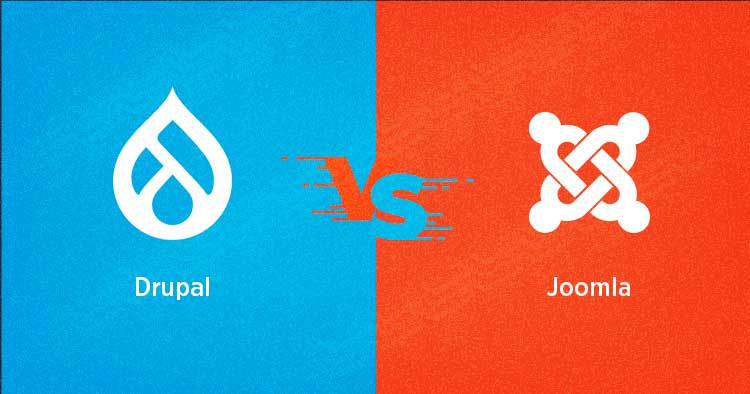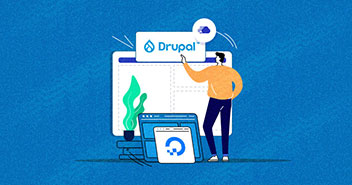
Whether you’re a freelance developer, blogger, store owner, or development agency, you need the perfect content management system that does more than just the basic functions. Of the many options available in the market, Joomla and Drupal remain top of mind. In this piece, I’ll compare the two for your benefit.
These are the most prevalent content management systems (CMS) out there. Let’s jump in.
Drupal
Drupal is the third most popular CMS platform in use. Released in 2001, this older CMS aims to offer reliable performance, strong security, and customizability, which makes it a better option for agencies and freelancers who are developing sites for clients.
As compared to Joomla, Drupal is a very powerful and developer-friendly tool useful for building complex websites. It offers exceptionally great documentation and support with clear, high-quality code and API, but it is very complicated and developers have to truly “learn” Drupal to be able to avail it atd full potential. It also offers incredible stability when millions of clients are accessing the site at the same time.
With strong Access Control List capabilities and version control, enterprise clients are increasingly choosing Drupal as their favored Content Management System.
Advantages:
- Webpage creation pages and panels are simple and highly secure.
- Makes a difference for you to manage complex, multi-domain administration
- Has better security measures as compared to other CMS
- Offers amazing SEO extensions, libraries that make your websites search engine friendly.
Disadvantages:
- Drupal is very complicated to learn and understand as compared to Joomla.
- Requires a hosting service and domain name as it doesn’t offer hosted services.
- Extension and updates are not always compatible.
Popular sites using Drupal:
- Pinterest.com
- Nvidia.com
- Homedepot.com
- Nih.gov
- Docusign.com
Nothing as Easy as Deploying PHP Apps on Cloud
With Cloudways, you can have your PHP apps up and running on managed cloud servers in just a few minutes.
JOOMLA
Joomla allows you to build websites and different sorts of business-oriented online applications. It runs easily on the foremost web servers without any issues, and is a highly extensive free-to-use CMS tool.
It’s simple enough to use that even a non-developer could build a good-looking website with it. The Joomla dashboard has some out-of-the-box settings, but it’s still simple to explore.
Joomla lets you oversee user access permissions from the dashboard by default, while you’d require a third-party expansion to do that with other CMS. Joomla installation utilizes cPanel, but doesn’t require complicated technical knowledge. It offers a perfect balance between ease of use and complexity of functionality, and is suited for a multi-user environment.
Advantages:
- Joomla offers an exceptionally easy-to-use admin panel to oversee large amounts of data.
- Suitable for websites that require more content management
- It allows you to see the configuration before installation begins
- Effective, user-friendly admin interface
Disadvantages:
- Built-in performance is very sluggish
- Weak logging and security issues
- Most of the useful plugins available are paid
Popular sites using Joomla
- Beytoote.com
- Zoznam.sk
- Newsbomb.gr
- Tourvisor.ru
- Seemorgh.com
What Drupal and Joomla Have in Common
Let’s start with the similarities. Both Joomla and Drupal are free and open-source content management systems. Apart from the free downloads, the two applications support thousands of free themes and free plugins to customize your website and create a unique user experience.
As for the installation process, both Drupal and Joomla require installation and hosting, unlike Wix and other cloud-based website builders. This installation is quite straightforward for both.
With Drupal and Joomla, you have the ability to make different kinds of powerful websites. You can create advanced and versatile websites with more content and structure with certain customization. Both have powerful developer APIs and extend the core functionality with add-ons.
In 2021, having a mobile-friendly website is not an option but a necessity. The increased usage of mobile devices demands that a website is responsive on all devices. Drupal and Joomla allow for mobile-friendly themes.
Drupal and Joomla also offer powerful and user-friendly admin panels, making it easy to manage a website’s content.
Drupal vs Joomla
Joomla and Drupal are both free, open-source content management systems (CMS) used for publishing web content. Whereas Drupal’s built-from-scratch approach permits for more noteworthy flexibility, Joomla’s built-in “core” content sorts allow for quicker and simpler execution.
Complexity:
Of the two, Drupal is known to be more complex, with a steeper learning curve. The CMS has all the powerful functionalities and the abilities to back larger projects, even enterprise level. This is what makes it more complex to use and develop. At the same time, this makes it harder for Drupal website owners to find a skilled Drupal developer. Joomla, on the other hand, is easier to use and to learn.
Community:
A strong and effective community means that there are several stakeholders, including developers, website owners, and professionals, all actively contributing to the development and issue resolution of an application. The level of engagement ultimately defines the success of the application. With both Drupal and Joomla, the communities are robust and highly responsive. Their community members help each other out and actively launch plugins and extensions. However, with Joomla, there’s a slightly upper hand, with a community that’s more accessible.
Modules and extensions:
Joomla has a limited marketplace for add-ons and modules. Also, Joomla users often encounter compatibility issues with some plugins, which require work on the PHP code. Drupal, however, has countless modules, themes, and extensions and the support of an active community.
Scalability:
Drupal is more scalable than Joomla, which is another reason why big and busy websites choose to use the former. The extremely extendable CMS is versatile and can be customized the way you want.
Security:
I saved the mention of security features for last because this is where things really take a turn. Drupal provides top-notch enterprise-level security, making it extremely hard for hackers to breach a website. This security-focused CMS powers the White House’s website and many other high-level organizations’ sites as well. On the other hand, Joomla is more prone to vulnerabilities, and its security team is not as large as Drupal’s either.
So Which is Better: Drupal or Joomla?
The significant difference between Drupal and Joomla is that Joomla is a bit more beginner-friendly. However, Drupal offers you more choices and flexibility, especially if you have a web development background.
The fact that Drupal is complex and requires technical expertise results in websites with high performance, stable and secure structure, and a clean, professional look. With Joomla, advanced users have limited adjustment options, giving Drupal an edge over medium to high-end users in the market.

